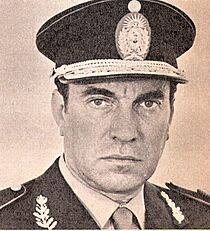Antonio Domingo Bussi facts for kids
Quick facts for kids
Antonio Domingo Bussi
|
|
|---|---|
 |
|
| Governor of Tucumán | |
| In office 28 October 1995 – 28 October 1999 |
|
| Lieutenant | Raúl Topa |
| Preceded by | Ramón Ortega |
| Succeeded by | Julio Miranda |
| Governor of Tucumán | |
| In office 24 March 1976 – 31 December 1977 |
|
| Preceded by | Amado Juri |
| Succeeded by | Lino Montiel Forzano |
| Personal details | |
| Born | 17 January 1926 Victoria, Entre Ríos, Argentina |
| Died | 24 November 2011 (aged 85) San Miguel de Tucumán, Tucumán Province, Argentina |
| Political party | Republican Force |
| Spouses | Josefina Beatriz Bigoglio de Bussi; 4 children |
| Profession | Career Argentine military officer (retired with rank of General) |
Antonio Domingo Bussi (born January 17, 1926 – died November 24, 2011) was an army general and politician from Argentina. He was an important figure in the history of Tucumán Province. Later in his life, he was found responsible for serious human rights violations that happened during a time when the military ruled Argentina.
Contents
Antonio Domingo Bussi's Life
Early Years and Military Career
Antonio Domingo Bussi was born in Victoria, Argentina, on January 17, 1926. He joined the National Military College in 1943 and became a second lieutenant in the Army's Infantry Division in 1947. He worked in different army locations and became an instructor.
In 1954, he was promoted to captain. He then studied at the War College to become a staff officer. He also went to the Command and General Staff College in the United States to learn more about military logistics (how to organize and move military supplies and people). After returning, he became a lieutenant colonel in 1964.
In 1969, Bussi was sent to observe the Vietnam War. Later, he was promoted to brigadier general in 1975. In December of that year, he took command of Operativo Independencia. This was a military operation ordered by President Isabel Perón to stop a rebel group called the People's Revolutionary Army (ERP) in Tucumán.
Governor of Tucumán
On March 24, 1976, the military took control of Argentina in what was called the National Reorganization Process. Antonio Bussi was then made Governor of Tucumán.
During his time as governor, the economy of the province was managed well. Many projects were completed, like an expressway connecting the capital to its northern suburbs. Also, new schools, parks, and clinics were built. A large factory for trucks and buses, owned by the Swedish company Scania, opened in Colombres during his term. This factory is still one of the biggest in Argentina. However, Bussi also faced accusations of using his position to gain a lot of personal wealth and taking properties without paying for them.
Bussi retired from the army in 1981 as a general.
After the Military Rule
When Argentina returned to democracy in 1983, many military members, including General Bussi, were accused of human rights violations. However, a law called the "Full Stop Law" was passed in 1986. This law limited how long people could be accused, which stopped many trials.
In 1990, President Carlos Menem pardoned Bussi and other military officers, as well as some rebel leaders. President Menem said this was to help the country heal after a difficult period.
After being pardoned, Bussi entered politics. In 1987, he ran for governor and got a surprising 18% of the votes. This encouraged him to create his own political party, the Republican Force. He ran for governor again in 1991 but lost to a popular singer, Ramón "Palito" Ortega.
In 1995, Bussi was elected Governor of Tucumán. During this time, he faced accusations of hiding money in a Swiss bank account.
In 1999, Bussi's son, Ricardo Bussi Bigoglio, ran for governor, but he lost. Antonio Bussi was then elected to the Lower House of Congress. However, Congress did not allow him to take his seat. This was because of his past actions related to human rights and accusations of misusing public money. In 2003, he was also arrested for his role in the disappearance of a politician, Congressman Guillermo Vargas Aignasse.
In 2003, new laws were passed that allowed trials for human rights abuses from the "Dirty War" period to continue. As a result, Bussi became a defendant in many cases. In 2004, a court ruled that the actions committed during his time as governor were serious human rights violations and could be prosecuted.
Bussi was placed under house arrest due to his health. In 2008, he was sentenced to prison for his actions.
Antonio Domingo Bussi passed away on November 24, 2011, at the age of 85. He was under house arrest in Yerba Buena at the time, but had been taken to a hospital due to his health.
See also
 In Spanish: Antonio Domingo Bussi para niños
In Spanish: Antonio Domingo Bussi para niños
 | Roy Wilkins |
 | John Lewis |
 | Linda Carol Brown |

